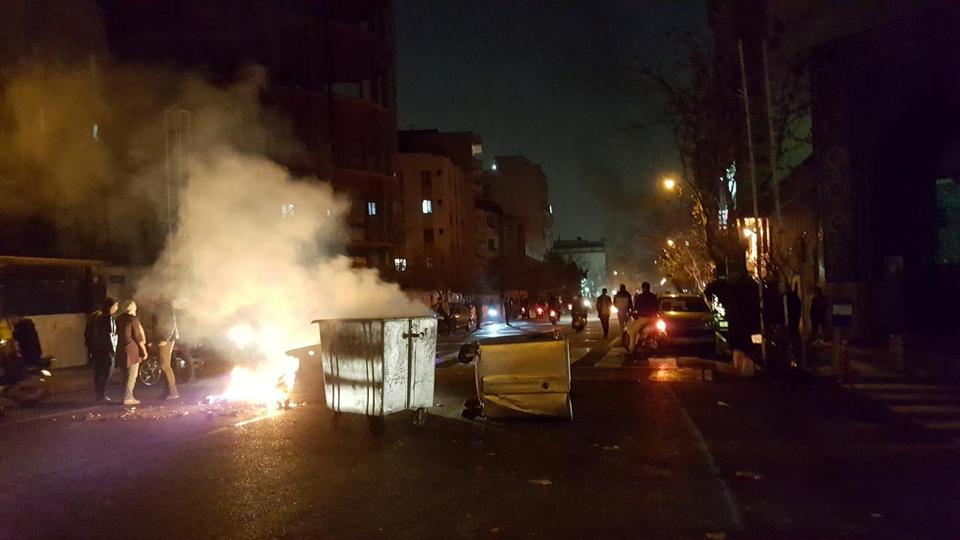At least 12 dead in Iran protests
Iranian state TV reported 10 people were killed in demonstrations on Sunday. At least two people died earlier in the protests that began on Thursday to draw attention to economic hardship.
Security forces in Iran repelled "armed protesters" who tried to take over police stations and military bases, state television said on Monday. It said 12 people have been killed in the nationwide protests, including 10 during clashes Sunday night.
Austerity budget
Rouhani came to power in 2013 promising to mend the economy and ease social tensions, but anger over high living costs and a 12 percent unemployment rate have left many feeling that progress is too slow.
Unemployment is particularly high among young people, who are generally considered less deferential to authority.
"Rouhani has run an austerity budget since 2013 with the idea that it's a tough but necessary pill to swallow to manage inflation and currency problems and try to improve Iran's attractiveness for investment," said Esfandyar Batmanghelidj, founder of the Europe-Iran Forum.
"But choosing years of austerity immediately after a very tough period of sanctions is bound to test people's patience," he told AFP.
Police have so far taken a relatively soft approach to the unrest. They deny shooting two men killed in Dorud on Saturday night, although information has been hard to obtain amid the near-total media blackout.
The authorities have blamed external forces for fomenting violence, saying the majority of social media reports were emanating from regional rival Saudi Arabia or exiled groups based in Europe.
Since the ruthless repression of the 2009 protests against a disputed presidential election that gave hardliner Mahmoud Ahmadinejad a second term, many middle-class Iranians have abandoned hope of securing change from the streets.
But low-level strikes and demonstrations have continued, with groups such as bus drivers, teachers and factory workers regularly protesting against unpaid wages and poor conditions.
"Some armed protesters tried to take over some police stations and military bases but faced serious resistance from security forces," state TV said.
It did not say where the attacks took place.
The protests began Thursday in Mashhad over economic issues and have since expanded to several cities. Hundreds of people have been arrested.
President calls for calm
Protests continued overnight Sunday, despite President Hassan Rouhani calling for calm and vowing more "space for criticism" in a bid to head off the unrest.
Rouhani finally broke his silence on Sunday night about the protests that mark the biggest test for the regime since mass demonstrations in 2009.
Police used tear gas and water cannon to disperse a small protest in Tehran's Enghelab Square on Sunday evening, according to unverified social media videos.
Protesters in the small northwestern town of Takestan torched a school for clergy and government buildings, the ILNA news agency said, while the state broadcaster said two people had died in Dorud after crashing a stolen fire engine.
There were also reports of protests in the cities of Izeh (southwest), Kermanshah and Khorramabad (west), Shahinshahr (northwest) and Zanjan (north).
Verifying reports remained challenging due to travel restrictions and sporadic blocks on mobile internet and popular social media sites including Telegram and Instagram.
Economic hardship driving protests
The protests began as demonstrations against economic conditions in the second-biggest city, Mashhad on Thursday but quickly turned against the government as a whole, with thousands marching in towns across Iran to chants of "Death to the dictator."
"The people are absolutely free in expressing their criticisms and even protests," Rouhani said in a message on the state broadcaster.
"But criticism is different to violence and destroying public property."
He sought a conciliatory tone, saying that government bodies "should provide space for legal criticism and protest" and calling for greater transparency and a more balanced media.
Trump weighs in
US President Donald Trump said the "big protests" showed people "were getting wise as to how their money and wealth is being stolen and squandered on terrorism."
